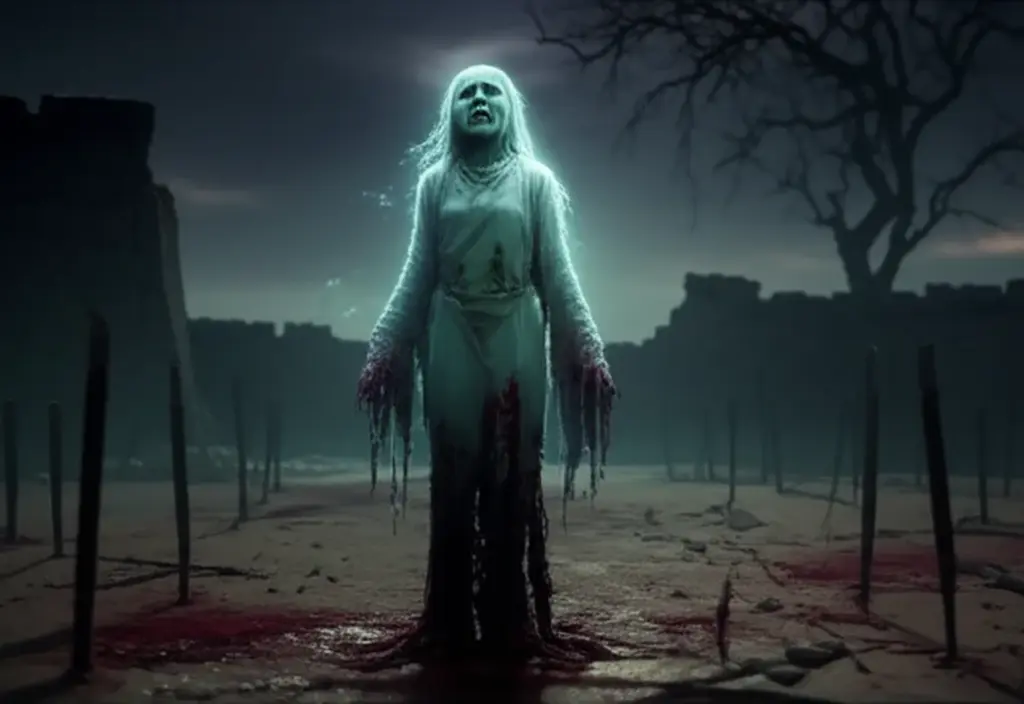The Execution Ground Ghost (刑场鬼 – Xíngchǎng Guǐ) is a vengeful spirit in Chinese folklore believed to haunt the locations where public executions were once carried out. Also known as the Execution Yard Spirit or Specter of the Penal Field, this ghost represents the lingering wrath of those unjustly executed or wronged during their final moments.

In traditional Chinese belief, death without proper rites and recognition can trap the soul in the physical world, especially when that death occurs violently or under injustice.
This entity is often associated with ancient capital cities, particularly in Beijing, Nanjing, and Luoyang, where imperial executions took place in open fields or designated areas. The presence of these spirits was feared by locals, who believed they could bring misfortune, madness, or even death to those who disturbed their resting places.
Information
- Name: Execution Ground Ghost / 刑场鬼 / Xíngchǎng Guǐ
- Gender: Varies (based on the identity of the executed)
- Age: Over 2,000 years old; associated with execution rituals dating back to the Han Dynasty.
- Abilities: Haunting dreams, causing sudden illness, inducing fear and paranoia, manifesting near old execution sites
- Interests: Seeking justice, haunting descendants of executioners, appearing during anniversaries of executions
- Weaknesses: Buddhist rituals, Taoist exorcisms, offerings at former penal grounds
Origin
The origins of the Execution Ground Ghost trace back to ancient China’s judicial system, particularly during the Han Dynasty (206 BCE–220 CE) through the Qing Dynasty (1644–1912), when public executions were common spectacles meant to deter crime. These events often occurred in open fields or town squares called Xingchang (刑场), which translates to “execution ground.”
According to folkloric accounts, individuals who were wrongly accused, tortured, or denied proper burial rites would return as vengeful spirits, lingering at the very location of their demise. One well-documented tale involves a scholar falsely accused of treason during the Ming Dynasty, whose ghost reportedly appeared every year on the anniversary of his death, weeping blood near the former execution site.
These stories became embedded in local traditions, with villagers avoiding certain areas and performing annual ghost appeasement ceremonies to prevent disturbances from restless souls.
Characteristics
The Execution Ground Ghost typically appears as a pale, emaciated figure cloaked in ragged robes stained with dried blood. Unlike other vengeful spirits such as the Jiangshi (僵尸 – hopping vampire), it does not move unnaturally but instead floats silently, often with empty eye sockets or a mouth twisted in silent screams. Some witnesses describe hearing distant cries or the sound of chains dragging before the ghost manifests.
Its energy is primarily emotional—grief, rage, and despair—and those who encounter it may experience vivid nightmares or develop unexplained illnesses. In some legends, the ghost seeks revenge not only against those directly responsible for its fate but also their descendants, perpetuating curses across generations.
In rare cases, the spirit may appear in human form, seeking help to find peace through Buddhist prayers or ancestral remembrance ceremonies.
Cultural Significance
The Execution Ground Ghost holds deep cultural significance in Chinese spiritual tradition, symbolizing the consequences of unjust authority, wrongful death, and the importance of ancestral rites. Its presence in folklore reflects historical fears surrounding the law, morality, and the afterlife.
This ghost appears in various forms of traditional opera, especially Peking Opera, where scenes of spectral vengeance are performed to warn audiences about the dangers of corruption and cruelty. It has also inspired modern media, including films like “The Blood of Yingzhou District” (2007) and TV dramas such as “Curse of the Execution Ground” (2018).
In rural communities, elders still warn children to avoid old execution sites, and during the Hungry Ghost Festival (农历七月十五 – Zhōngyuán Jié), families burn incense and offer food to appease wandering spirits, including Xíngchǎng Guǐ, ensuring peace between the living and the dead.
